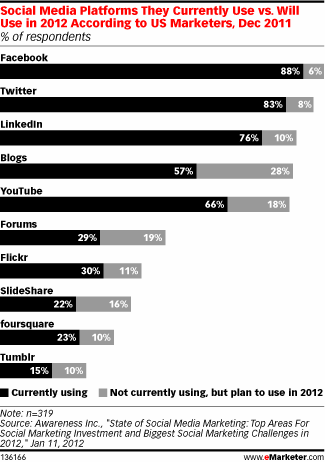A recent eMarketer article told an interesting tale on what marketers are planning for social activity in 2012. Not surprisingly, the majority of respondents marked Facebook, Twitter, and LinkedIn as the top 3 places where they are currently active. After all, these are easily the most talked-about social networks right now, and are poised to continue to be tremendously effective in connecting with customers for the foreseeable future.
Blogs came in at #4 on the list. This shouldn’t be too much of a shock, since blogs are one of the oldest forms of ‘social’ on the list, according to how we define it today. We should take note that every item on this list (with the exception of ‘blogs’ and ‘forums’) are specific ‘sites’, like Twitter and Flickr for example. ‘Blogs’ however is a pretty broad term, and includes innumerable variations across such platforms as Blogger, WordPress, Tumblr, Posterous, and more.
What might surprise you, however, is that of all the social options available to marketers, blogs are indicated as the one area that will see the greatest increase in activity in 2012. Why would this be? Shouldn’t blogs be the one area that would see the LEAST amount of growth, since there are other newer shinier social sites popping up all the time? You’d think so, but you’d be wrong.
Businesses must recognize the extensive list of benefits that come as a result of maintaining a relevant and up-to-date blog. Blogs are one of the most effective ways to convey what your brand is REALLY all about. What you talk about, and how you talk about it, gives your readers a very personal insight in to what the culture of your business is. It sheds light on what the core values and beliefs are in your organization by addressing what you stand for, how you view issues facing your customers, and how open your business is to talking about what’s going on behind the logo.
In addition to the obvious ‘branding’ benefits that come with maintaining a blog, there are many other benefits that might not be apparent at first glance. Not the least of which is the boost you can achieve in organic search traffic. You see, it’s most likely that your main website is optimized for a certain collection of keywords. These are typically your brand name, specific product names, and product or service types. However, when writing blog posts you create an entirely new batch of content that answers completely different types of search queries.
While your public website might be optimized for terms or things like ‘computer repair’, or ‘flower arrangements’, your blog posts will start to appear in search results because of specific questions that they answer. For example, if we use the ‘flower arrangements’ product/business type, you might write a blog post about ‘Most Popular Spring Flowers for Weddings’. Now, this blog post would appear in the search results for much more specific questions about that particular topic, like “what kind of flowers should i choose for a spring wedding?”. You’re not just showing up to sell ‘flowers’, you’re showing up to answer a particular call for help.
My experience has shown that searchers who find helpful content as a result of a more specific question, rather than just a product page appearing from a short keyword, are more likely to spend more time on the site READING the material that answers their questions. Through blog posts, you’re not just trying to sell them something; you’re trying to help them learn more about the topics that interest them. The goodwill that occurs through being genuinely helpful goes a long way to building relationships with your readers, so that when they do need to buy, you’re much more likely to be their first choice.
The big bold benefits of blogging for business will come in varying degrees, based on the approach you take. The more you do, the benefits grow exponentially. If you’re simply using it as a press release newsfeed, don’t expect much in terms of results. If you’re using it to reach out, to answer questions, to offer help, and to provide added value for your readers then your hard work will pay off. Let’s just hope that for the sake of readers everywhere that the increase in efforts of businesses in 2012 will be of the more ‘helpful’ variety.
This article originally written for http://crowdshifter.com
